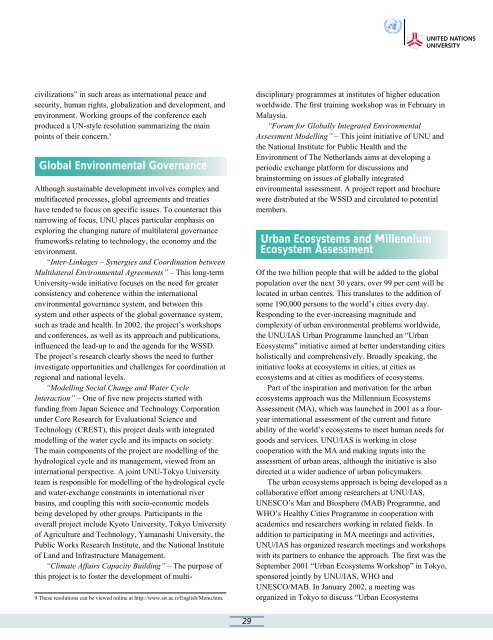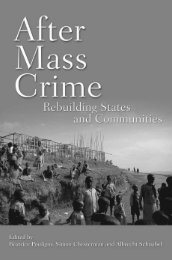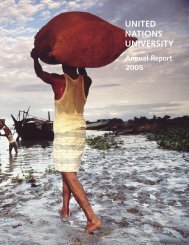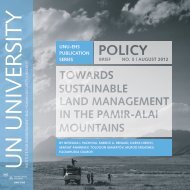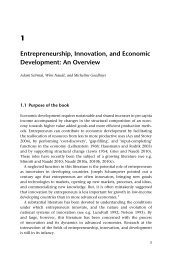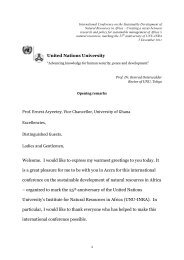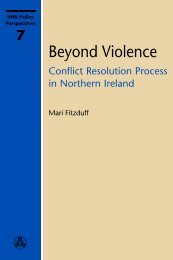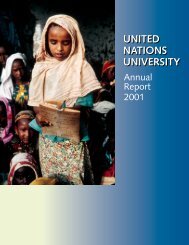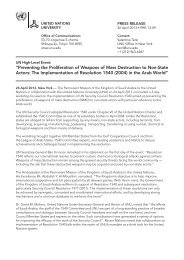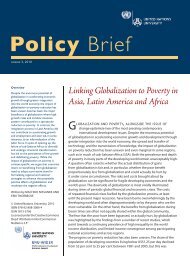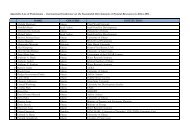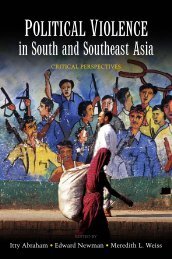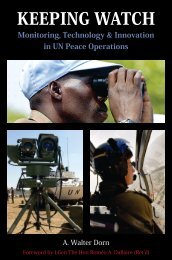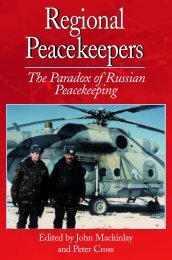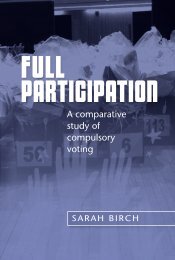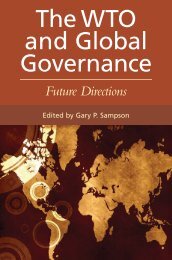Environment and Sustainable Development - United Nations ...
Environment and Sustainable Development - United Nations ...
Environment and Sustainable Development - United Nations ...
Create successful ePaper yourself
Turn your PDF publications into a flip-book with our unique Google optimized e-Paper software.
civilizations” in such areas as international peace <strong>and</strong><br />
security, human rights, globalization <strong>and</strong> development, <strong>and</strong><br />
environment. Working groups of the conference each<br />
produced a UN-style resolution summarizing the main<br />
points of their concern. 9<br />
Global <strong>Environment</strong>al Governance<br />
9 These resolutions can be viewed online at http://www.sir.ac.ir/English/Menu.htm.<br />
Although sustainable development involves complex <strong>and</strong><br />
multifaceted processes, global agreements <strong>and</strong> treaties<br />
have tended to focus on specific issues. To counteract this<br />
narrowing of focus, UNU places particular emphasis on<br />
exploring the changing nature of multilateral governance<br />
frameworks relating to technology, the economy <strong>and</strong> the<br />
environment.<br />
“Inter-Linkages – Synergies <strong>and</strong> Coordination between<br />
Multilateral <strong>Environment</strong>al Agreements” – This long-term<br />
University-wide initiative focuses on the need for greater<br />
consistency <strong>and</strong> coherence within the international<br />
environmental governance system, <strong>and</strong> between this<br />
system <strong>and</strong> other aspects of the global governance system,<br />
such as trade <strong>and</strong> health. In 2002, the project’s workshops<br />
<strong>and</strong> conferences, as well as its approach <strong>and</strong> publications,<br />
influenced the lead-up to <strong>and</strong> the agenda for the WSSD.<br />
The project’s research clearly shows the need to further<br />
investigate opportunities <strong>and</strong> challenges for coordination at<br />
regional <strong>and</strong> national levels.<br />
“Modelling Social Change <strong>and</strong> Water Cycle<br />
Interaction” – One of five new projects started with<br />
funding from Japan Science <strong>and</strong> Technology Corporation<br />
under Core Research for Evaluational Science <strong>and</strong><br />
Technology (CREST), this project deals with integrated<br />
modelling of the water cycle <strong>and</strong> its impacts on society.<br />
The main components of the project are modelling of the<br />
hydrological cycle <strong>and</strong> its management, viewed from an<br />
international perspective. A joint UNU-Tokyo University<br />
team is responsible for modelling of the hydrological cycle<br />
<strong>and</strong> water-exchange constraints in international river<br />
basins, <strong>and</strong> coupling this with socio-economic models<br />
being developed by other groups. Participants in the<br />
overall project include Kyoto University, Tokyo University<br />
of Agriculture <strong>and</strong> Technology, Yamanashi University, the<br />
Public Works Research Institute, <strong>and</strong> the National Institute<br />
of L<strong>and</strong> <strong>and</strong> Infrastructure Management.<br />
“Climate Affairs Capacity Building” – The purpose of<br />
this project is to foster the development of multidisciplinary<br />
programmes at institutes of higher education<br />
worldwide. The first training workshop was in February in<br />
Malaysia.<br />
“Forum for Globally Integrated <strong>Environment</strong>al<br />
Assessment Modelling” – This joint initiative of UNU <strong>and</strong><br />
the National Institute for Public Health <strong>and</strong> the<br />
<strong>Environment</strong> of The Netherl<strong>and</strong>s aims at developing a<br />
periodic exchange platform for discussions <strong>and</strong><br />
brainstorming on issues of globally integrated<br />
environmental assessment. A project report <strong>and</strong> brochure<br />
were distributed at the WSSD <strong>and</strong> circulated to potential<br />
members.<br />
Urban Ecosystems <strong>and</strong> Millennium<br />
Ecosystem Assessment<br />
Of the two billion people that will be added to the global<br />
population over the next 30 years, over 99 per cent will be<br />
located in urban centres. This translates to the addition of<br />
some 190,000 persons to the world’s cities every day.<br />
Responding to the ever-increasing magnitude <strong>and</strong><br />
complexity of urban environmental problems worldwide,<br />
the UNU/IAS Urban Programme launched an “Urban<br />
Ecosystems” initiative aimed at better underst<strong>and</strong>ing cities<br />
holistically <strong>and</strong> comprehensively. Broadly speaking, the<br />
initiative looks at ecosystems in cities, at cities as<br />
ecosystems <strong>and</strong> at cities as modifiers of ecosystems.<br />
Part of the inspiration <strong>and</strong> motivation for the urban<br />
ecosystems approach was the Millennium Ecosystems<br />
Assessment (MA), which was launched in 2001 as a fouryear<br />
international assessment of the current <strong>and</strong> future<br />
ability of the world’s ecosystems to meet human needs for<br />
goods <strong>and</strong> services. UNU/IAS is working in close<br />
cooperation with the MA <strong>and</strong> making inputs into the<br />
assessment of urban areas, although the initiative is also<br />
directed at a wider audience of urban policymakers.<br />
The urban ecosystems approach is being developed as a<br />
collaborative effort among researchers at UNU/IAS,<br />
UNESCO’s Man <strong>and</strong> Biosphere (MAB) Programme, <strong>and</strong><br />
WHO’s Healthy Cities Programme in cooperation with<br />
academics <strong>and</strong> researchers working in related fields. In<br />
addition to participating in MA meetings <strong>and</strong> activities,<br />
UNU/IAS has organized research meetings <strong>and</strong> workshops<br />
with its partners to enhance the approach. The first was the<br />
September 2001 “Urban Ecosystems Workshop” in Tokyo,<br />
sponsored jointly by UNU/IAS, WHO <strong>and</strong><br />
UNESCO/MAB. In January 2002, a meeting was<br />
organized in Tokyo to discuss “Urban Ecosystems<br />
29


